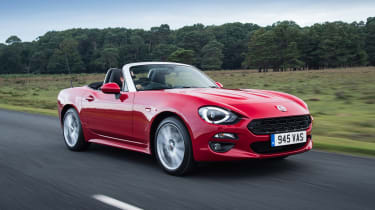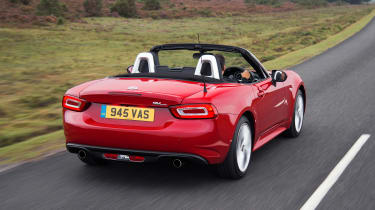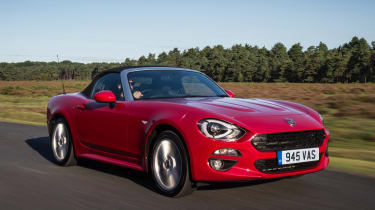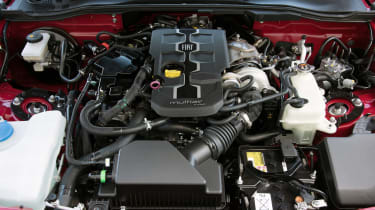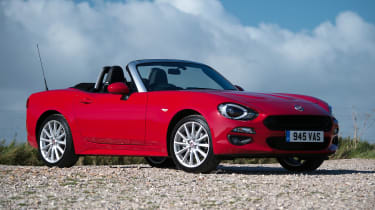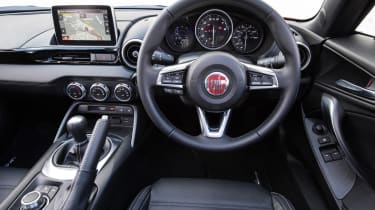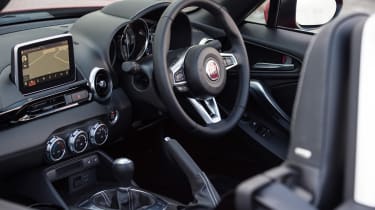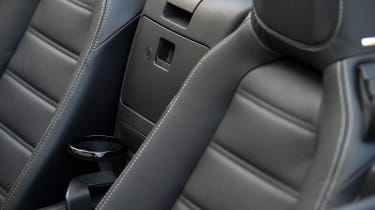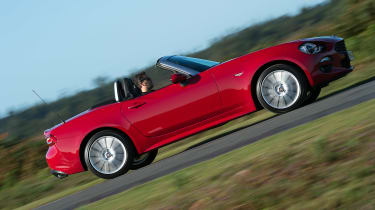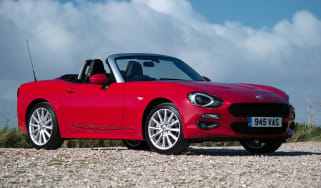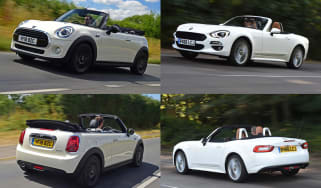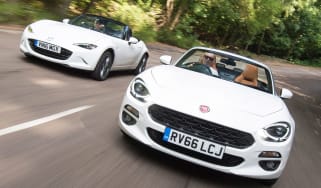Fiat 124 Spider (2016-2019) review
The Fiat 124 Spider uses Mazda MX-5 mechanicals to create a characterful two-seat roadster

PCP finance available
The new Fiat 124 Spider marks the Italian brand’s return to the affordable roadster market after an absence of more than decade. Heavily based on the Mazda MX-5, the newcomer combines that car’s agile rear-wheel drive handling with Fiat’s own turbocharged MultiAir engine. The 124 Spider also features totally unique exterior styling – although the interior is carried over largely unchanged from the Mazda.
The Fiat can trace its roots back to the original 124 Spider, which made its debut back in 1966 and continued in production for nearly two decades. Then, in 1995, Fiat had another stab at the roadster market with the pretty Barchetta. However, this car was front-wheel drive and only available in left-hand drive, meaning sales were slow, particularly in the face of rivals such as the MX-5.
So for this revived 124 Spider, Fiat has decided that ‘if you can’t beat ‘em, join ‘em’. As a result, the new car is essentially a re-skinned Mazda MX-5.
Every single body panel is changed to give the Fiat its own identity, but the underlying structure, suspension and even the interior are taken wholesale from the Mazda. The Fiat is also built alongside the MX-5 at Mazda’s Hiroshima factory in Japan.
More reviews
Car group tests
Road tests
Used car tests
Externally, the Fiat looks different enough from the Mazda MX-5. Yet with its longer overhangs (the Fiat is 139mm longer overall), gaping front grille and slab sides, the 124 Spider doesn’t looks as compact or stylish as the tautly designed and perfectly proportioned Mazda.
Yet while fans of the sixties original will no doubt be dismayed at this blatant badge-engineering, it does mean the 124 Spider is fun to drive, solidly built and relatively affordable. And while much of the Fiat is Japanese, its heart is still 100 percent Italian.
Under the sculpted bonnet (a clear nod to the sixties original) is Fiat’s own 138bhp turbocharged 1.4-litre MultiAir petrol engine. It doesn’t rev quite as eagerly as the naturally aspirated 1.5 and 2.0-litre units used in the MX-5, but it’s as quick as the latter thanks to its muscular 240Nm torque output. It’s also more relaxing to drive, because you don’t need to work the engine as hard to access strong performance.
Currently, this engine is the only option available to British 124 Spider buyers – the American market car gets a more potent 160bhp version of the same powerplant. However, an even more powerful and sharper handling Abarth model is on the way.
Like the Mazda MX-5 powerplants, this engine drives through a six-speed manual gearbox, yet unlike its Japanese cousin the Fiat 124 Spider is also available in the UK with a six-speed automatic.
Look past the Fiat’s badge-engineered roots and you’ll discover a talented and desirable roadster. With its turbocharged engine, suspension tweaks and slightly more upmarket interior, the 124 Spider has a more grown-up character that’s all its own. It’s slightly easier to live with than the Mazda MX-5 day-to-day, which for many buyers will make it a more attractive proposition. More importantly, fans of fun and affordable roadsters should celebrate the fact that there’s now an alternative to the Mazda MX-5, even if it's effectively the same car under the skin.
Engines, performance and drive
Given that the 124 Spider is essentially a Mazda MX-5 in an Italian suit, the newcomer promises to be hugely entertaining to drive. It weighs around 30kg more at 1,050kg, yet everything else about the car’s underpinnings is largely unchanged. That means you get the same real-wheel drive layout, plus double wishbone suspension at the front and a multi-link set-up at the rear.
That said, Fiat’s engineers have stiffened the springs and dampers, plus they’ve changed the anti-roll bars and recalibrated the electrically assisted steering.
As a result, the Fiat feels extremely nimble and agile through a series of corners. The steering is quick and accurate and features more meaty weighting than the Mazda.
There isn’t masses of grip, but that means it’s possible to subtly adjust the Spider’s line through a corner using a combination of steering and throttle. And when the 124 Spider does reach the limit of grip it begins to slide progressively and the electronic safety systems smoothly intervene.
Switch the stability control off, and the Fiat’s traditional rear-wheel drive layout and torquey power delivery allows you to indulge in controllable sideways slides in slippery conditions, but there’s no limited slip differential so it’s not really a car for show-boating, smokey tailslides.
The Fiat resists roll better than the Mazda, meaning it feels flatter during hard cornering. Yet the damping is excellent, so any body movements are well controlled – the Spider comfortably shrugs off mid-corners bumps.
There’s a firm edge to the ride at low speed, plus a tiny amount of body flex over really severe potholes, but the rest of the time the Fiat is comfortable and composed.
Refinement is as good as you’d expect for this type of car, too. With the hood raised there is some wind noise at high speed, but it’s rarely intrusive and no worse than the roar from the tyres. Drop the roof and the Fiat’s cabin remains a surprisingly calm place, thanks in part to a small wind deflector that sits between the roll hoops behind the seats.
Another dynamic highlight is the all-disc braking set-up, which delivers effortless stopping power. The system also benefits from a progressive pedal action that makes it easy to slow the Spider smoothly.
Engines
Currently, there’s only one engine to choose from – a turbocharged 1.4-litre four-cylinder petrol unit. It’s essentially the same MultiAir unit that’s used in the Abarth 500.
In the 124 Spider it delivers a respectable 138bhp, which places it between the entry-level 129bhp1.5-litre MX-5 and Mazda’s flagship 158bhp 2.0-litre car. However, where the Fiat scores over its sister car is torque. Thanks to its turbocharger, the 124 Spider delivers a muscular 240Nm (the 2.0-litre Mazda produces 200Nm) at just 2,250rpm, which means it responds more eagerly to the throttle at low revs.
According the official figures the Fiat will cover the 0-62mph sprint in just 7.5 seconds. Yet that wave of mid-range torque means it feels even faster in the real world. And more relaxing, because you can often stay in a higher gear without the need to shift down to accelerate past slower traffic or up a motorway incline.
However, while you don’t need to change gear all that often, you’ll probably do it anyway. That’s thanks largely to the six-speed manual that benefits from a quick, precise and short throw action. It’s not the same gearbox as in the Mazda, but you wouldn’t know from using it. Buyers who want to take things a little easier can choose the six-speed automatic, which can also perform manual changes via the steering wheel mounted paddles. The automatic is not available from launch but will be offered in 2017; we tried the gearbox in the Abarth version of the 124 Spider and it wasn't the smoothest of auto boxes making I come to the conclusion sticking with the manual would be the better option.
The 1.4-litre unit sounds pretty good, too. It doesn’t have the same appetite for revs as the Mazda units, but it benefits from a subtly raspy exhaust note that’s reminiscent of the 1960s original. Yet it settles down to a background hum at a cruise, and in combination with the torquey power delivery it allows the Fiat to perform a little like a mini GT car.
MPG, CO2 and Running Costs
Most sports car buyers will be buying with their heart rather than their head, but the Fiat 124 Spider does a good job of mixing driving excitement with low running costs.
Thanks to its blend of reasonably low kerbweight of 1,050kg and the addition of stop start, the Fiat promises to return a decent 44.1mpg at the pumps.
You can expect this figure to drop if you drive the 124 Spider with sort of verve its handling and engine encourage, but that low kerbweight means that it’s never likely to turn into a gas guzzler.
Claimed CO2 emissions of 148g/km mean a year’s road tax will set you back £145, which is a saving of £35 over the 2.0-litre MX-5 and just £15 more than the 1.5-litre Mazda.
Until Fiat announces prices for the 124 Spider it’s hard to know what sort of benefit in kind company car tax bills business users can expect. However, with its low CO2 emissions it’s likely to be cheaper to run than the larger-engined Mazda, even if Fiat gives it a higher list price.
Given the car’s reasonably simple mechanicals, servicing costs should be reasonable. However, bear in mind that other Fiat models with the same 1.4-litre MultiAir engine have relatively short service intervals of 9,000 miles or 12 months, whichever comes sooner. That said, many of these cars will be used as weekend runarounds, or for high days and holidays, so are unlikely to rack up huge annual mileages.
Depreciation
Our experts have yet to calculate residuals for the Fiat, but it’s likely to deliver similar 45-50 percent returns after three years as the Mazda MX-5. Expect strong demand for early cars with prices for nearly new models staying high to reflect the car’s popularity.
Interior, design and technology
The Fiat 124 Spider is heavily based on the Mazda MX-5, but Fiat’s designers have worked hard to hide the newcomer’s Japanese roots.
Taking its cues from the 1960s original, the 124 Spider features completely bespoke exterior panels. Retro themed touches include the narrow trapezoidal grille at the front, plus a pair of ‘power’ bulges in the bonnet. Another nostalgic detail is the silver finish windscreen surround that harks back to the chrome frame of the old car.
The addition of the new panels mean the Spider is 139mm longer than the MX-5 and 10mm wider. These aren’t big increases, but the changes are enough to result in the Fiat being hobbled with slightly awkward proportions compared to the Mazda.
Entry-level models get 16-inch alloy wheels, while more expensive versions feature 17-inch alloy wheels. LED headlamps, running lights and body coloured door mirrors are standard across the range.
One exterior feature that’s shared with the Mazda is the fabric folding roof. It’s a manually operated hood, but opening and closing it is essentially a one handed operation – simply release the latch above the rear-view mirror, then pull the roof open in one movement. There’s currently no powered option.
With the roof open you’ll spot the two silver rollover hoops that protect the driver and passenger in the event of a serious accident.
While Fiat has given the 124 Spider a completely different look to the Mazda MX-5 it’s based on, it has spent less time and effort with the interior. In fact, it’s made virtually no changes at all to the cabin – apart from a Fiat badge on the steering wheel hub, revised door panels and new trim materials it’s pure Mazda inside.
In many respects that’s no bad thing, because the Fiat benefits from the same slickly designed and well laid out cabin. Ahead of the driver is a heavily cowled instrument binnacle that houses a large centrally mounted rev counter that’s flanked one side by a smaller speedo and by a trip computer and fuel gauge on the other.
The dashboard gets a neat wraparound design that flows neatly into the door trim mouldings to give the interior a cosy feel, while flashes of gloss black and brushed silver trim help create an upmarket look. Unfortunately the Fiat doesn’t get the Mazda’s eye-catching body colour trim inserts, but it does retain the same metal finish eye-ball air-vents and rotary climate controls, while a soft touch covering for the dashtop helps raise the tone.
The quality is excellent, with extremely solid fit and finish and plenty of soft touch materials. Higher specification cars are also available with leather trim for the high backed seats. The switchgear also operates with the well-oiled precision you’d expect given the car’s Japanese roots.
Sat-nav, stereo and infotainment
The Fiat 124’s infotainment system is pretty much identical to the Mazda’s, which means entry-level models get a four-speaker AM/FM stereo and USB connection, but no DAB radio. On the plus side, the radio is mounted high on the dashboard, making it easy to use – although there are also handy steering wheel controls.
More expensive models benefit from even more technology, including Bluetooth connection for mobile phones and music streaming, plus two extra speakers integrated into the driver’s seat headrest.
Crucially, this set-up also benefits from a tablet style seven-inch touchscreen that’s mounted on top of the dashboard above the centre air vents. The set-up is easy to use as it is, but you can also access the various functions using an iDrive-style rotary controller located between the front seats. Other handy features include the Aha and Stitcher apps that allow you to access online services via your mobile phone.
A clearly mapped and easy to use sat-nav system is also available, while you can upgrade to a Bose sound system if you feel the need. This set-up features nine-speakers, including a powerful sub woofer.
Practicality, comfort and boot space
You don’t buy a two-seat roadster to ferry a family around in, but the Fiat is roomy and practical enough for day-to-day use.
Despite featuring larger external dimensions than the Mazda MX-5 it’s based on, the 124 Spider features no more room inside. That’s no bad thing, because while you’d struggle to call the interior spacious, there’s more than enough room for two adults. There’s also a wide range of seat adjustment and even with the fabric roof raised, the Fiat feels cosy rather than cramped.
Perfectly laid out pedals, a stubby gearlever within easy reach and decent visibility all contribute to a relaxing driving experience.
There’s also adequate storage space, with a decent-sized glovebox, a pair of cupholders set into the transmission tunnel and a large lockable lidded cubby in the bulkhead behind the front seats.
On the plus side, the Fiat’s longer rear overhang has resulted in a bigger boot. That said, at 140-litres the 124 Spider’s load area is only ten litres larger, but in a car this small every little helps. There’s more than enough room for a couple of large squashy bags, meaning you could happily contemplate a couple of weeks away if you don’t mind travelling light. You can also expect Fiat to offer a bootlid mounted luggage rack as an option.
Better still, because the Fiat’s roof mechanism is so compact, when stowed it doesn’t eat into the available carrying capacity.
Reliability and Safety
Not only is the Fiat 124 Spider a Mazda under the skin, it’s built alongside the MX-5 at the Japanese brand’s Hiroshima plant. That means you can expect the Fiat to be durable and largely dependable.
Unlike many Fiat models, the 124 Spider feels very solidly screwed together, with tight shut lines for the all the panels and a glossy paint finish. The interior also feels extremely well-built, plus the materials have top quality look and feel.
The only real difference between the MX-5 and 124 Spider is to be found under the bonnet, where the latter uses Fiat’s 1.4-litre MultiAir unit. While it features advanced features such as turbocharging and variable valve timing, the unit is tried and tested in a whole host of Fiat and Alfa Romeo models, so should give very little trouble.
The Fiat gets a decent haul of safety kit, including four airbags, stability control, tyre pressure monitoring and hill hold assist. You can also add lane departure warning and blind spot monitoring with rear cross traffic alert as options.
Yet despite this impressive tally of passive active and safety systems, the Fiat is likely to be awarded the same four-star EuroNCAP rating as the mechanically identical Mazda MX-5. However, this result is more a reflection of the lack of cutting edge safety kit such as autonomous emergency braking than any fundamental safety failing in the car’s design.
Warranty
Like all Fiat models, the 124 Spider benefits from a three-year unlimited mileage warranty, which is an improvement over Mazda’s limit of 60,000 miles. Also included is a three-year paint guarantee, while the car also has an eight-year protection policy against rust. There’s a one-year roadside recovery package included with the car too.
Both the warranty and breakdown cover can be extended at extra cost if you’re planning on keeping the car for longer and want some extra piece of mind.
Servicing
If the Fiat has an ownership Achilles heel, then it’s the relatively short 9,000 service intervals. Still, these types of car rarely rack up huge mileages, so it’s unlikely you’ll have to visit one of Fiat’s 160 dealers more than once a year.
Happily, visiting the brand’s dealer network shouldn’t be too much of a chore, as it finished a respectable 11th out of 32 in our 2015 Driver Power customer satisfaction survey.
